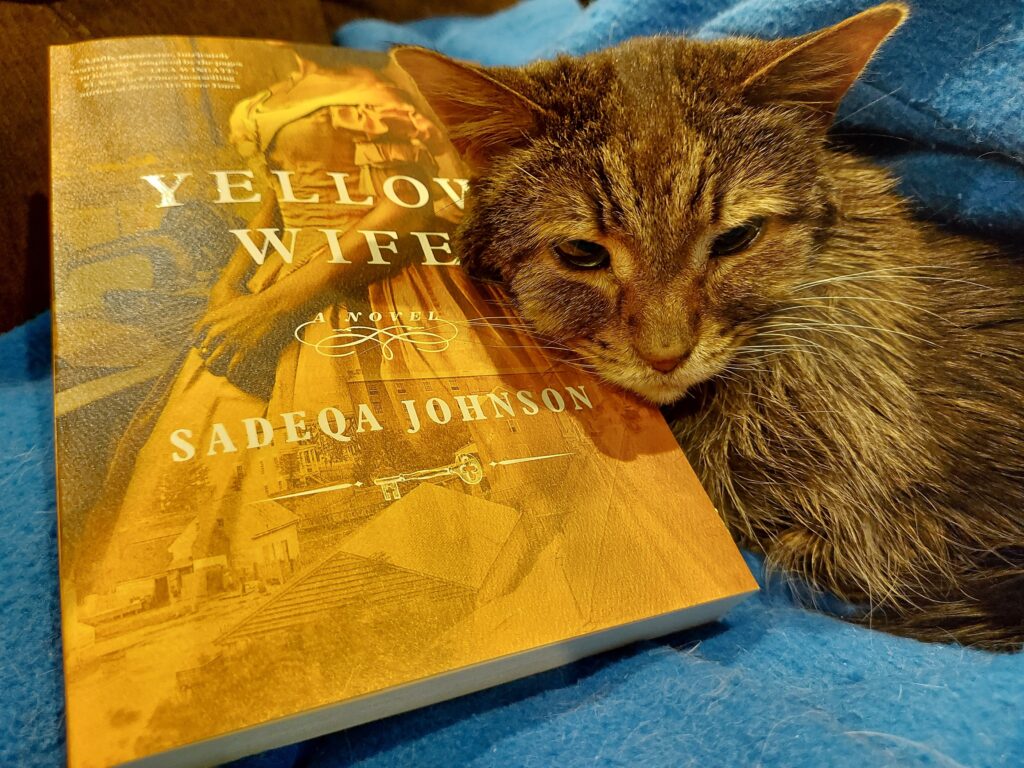Yellow Wife by Sadeqa Johnson

Yellow Wife is at times a difficult novel to read. Not because it’s boring or poorly written, but because of its honest depiction of its subject matter: slavery in antebellum US. Sadeqa does not shy away from vividly describing the horrifying treatment of African American slaves by their white masters. I’m not going to go into detail as it was difficult enough to stomach it while reading it. There were a few scenes in this novel where I had to stop reading for a moment and talk myself back into reading more. I’m not sharing this with you to turn you away from reading this novel. I think you should read it. I just can’t believe that people would treat other people the way white slave owners treated their slaves. But I don’t want to turn this review of Yellow Wife into a discourse on slavery. This novel speaks for itself on that subject.
What I found interesting about this novel is a subject that I have not come across in any of my readings of the pre-Civil War era until this point: white men who took “yellow wives” (for those of you who aren’t sure what a “yellow wife” is, she is a light-skinned slave). Yellow Wife is based on a real slave trader, Robert Lumpkin, and his wife Mary (but don’t Google them until after you finish reading the novel otherwise you will spoil the ending). These men did not legally marry their yellow wives (interracial marriage did not become fully legal in the US until the 1960s), and still owned their wives as slaves, but the wives ran their husbands’ households and birthed their children while being lavished with beautiful dresses and jewellery. Why would a white man take a slave for a wife? Because although he may be wealthy, he is not respectable enough to get a proper white woman to marry him. Did these women like being married to their white masters? In Yellow Wife, the protagonist, Pheby Delores Brown, does not like being a yellow wife, and you can’t blame her for it.
Pheby is a 17-year-old slave who has been treated kindly by her master (who is also her father) but not so much by the master’s wife. She has been taught how to read, even though it is illegal for a slave to know how to read, and how to play the piano by her master’s sister. Her mother is a healer and has passed on her knowledge to Pheby. Pheby has been promised her “freedom” when she turns 18; her master intends to send her to boarding school in Massachusetts. She has helped the man she loves, another slave named Essex, escape from the plantation. Pheby and Essex plan on reuniting in the North. But of course, things don’t go to plan. Pheby’s mother ends up dead and while the master is away from the plantation, the master’s spiteful wife arranges for Pheby to be taken to a jail in Richmond, Virginia to be sold in a slave auction.
Pheby is spared from the auction by the man who runs the jail. At first, she is treated kindly and taken care of while she awaits the birth of her and Essex’s child, but it’s not long before she realizes what the Jailer really wants from her. As a woman and a slave in a (white) male dominated society, Pheby really has no choice in the matter if she doesn’t want her baby to suffer. She allows the Jailer to have his way with her in exchange for the safety of her children (Essex’s child and the children that she has with the Jailer) and a comfortable home. And as a result, she becomes an unwilling participant in the slave trade as she is tasked by the Jailer with dressing up young female slaves for the whorehouse.
Yellow Wife is definitely not light reading, but the ending is satisfying, if not quite how I hoped it would end. As difficult as it is to read this novel, Pheby is an admirable character as she is selfless and puts all her effort into the wellbeing of others. She has to make difficult choices and live with the consequences of those choices, but she hangs on to her hope and faith that things will get better even when there is so much horror going on around her. We could all use some of Pheby’s hope and faith.